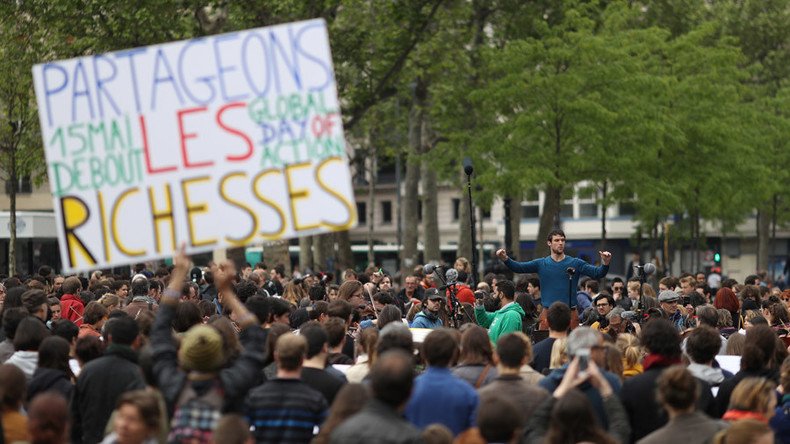Europe has answered the call of the French youth-led ‘Nuit Debout’ movement urging people to protest against austerity and other troubling social and economic issues. Rallies have been held in dozens of cities, with the largest crowds in Paris and Madrid.
The capital of Spain saw thousands rally in Madrid's Puerta del Sol square in solidarity with the French initiative, but also in commemoration of the fifth anniversary of their own similar protest movement ‘Indignados’ that saw mass rallies in 2011 and led to the creation of left-wing party Podemos, now Spain's third most-popular political party.
May 15, or March 76 of the Nuit Debout’s (Up All Night) calendar, was chosen willfully to stress the continuity of Spanish and French protests between the two movements.
The call for a “global day of action” was published on Nuit Debout’s website and social pages under the hashtag #GlobalDebout. The website now claims that some 266 towns in France along with 130 cities in Europe and worldwide have responded.
Photos posted on Twitter prove the statement – with people seen gathering in many European cities and even some locations outside.
Some European cities, like Geneva, London, Rome and others, have created their own Global Debout groups on social networks to draft followers.
According to a statement from movement organizers in France, people have been called to “occupy public spaces worldwide, to gather together, express themselves and take back politics into their hands.”
It also stressed that the causes of social, economic and environmental disasters have the same roots globally and therefore should be dealt with accordingly – through initiatives from citizens around the world. Thus through Global Debout they aimed to arrange local “autonomous” protests linked by an issue that is urgent for the region, be it austerity, low wages or jobs.
In France, it all started on March 31, after some 400,000 people marched in several cities across the country to protest labor reforms that would make it easier for employers to fire workers.
The movement has now grown into wider anti-government protests, with demonstrators expressing their grievances over a variety of issues besides labor reform.
READ MORE: ‘Democracy, where are you?’ Clashes erupt after French govt forces through labor law
Some of the movement protests have been turbulent: those occupying Place de la Republique in Paris, for instance, have been sporadically clashing with law enforcement officials.
In April, more than 20 demonstrators were injured in Rennes, and police used tear gas to disperse the protests all over the country. The protests have taken place in Paris, Marseille, Rouen, Rennes, Toulouse, and other cities.
Troubled by weeks of increasingly violent demonstrations, the French government on Sunday swore to clamp down the protests with no reservations.
Bernard Cazeneuve, the interior minister, while speaking in Rennes, where violent protesters resulted in severe damage to public property on Friday night, said that, “security forces face extremely violent groups who are not there to express their demands but to cause trouble, to destroy and to express hatred of the state […] it is intolerable and it will not be tolerated.”
The harsh warning comes after an 18-year-old protester was placed under investigation for ‘attempted murder of a policeman’ during a demonstration on May 3, when in the heat of the protest several youngsters pushed an officer to the ground and hit him in the head with a metal beam.
Some 300 officers were injured in Nuit Debout protests across the country, with police planning to stage their own protest against “anti-cop hatred” during the upcoming week.
The Alliance police union, along with other groups representing officers, urged the staging of a national demonstration on May 18, “outraged by the irresponsible and persistent attempts to make it look like police officers are savages who blindly mutilate youths.”

